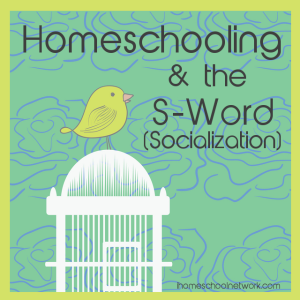
Socialization is a pretty hot topic for those in the homeschooling circles. Many of us are asked how we socialize our kids, how our kids will know how to interact with others, and other questions that really go to the root of how our children will be able to function well in society.
What is socialization?
Dictionary.com defines socialization as, “a continuing process whereby an individual acquires a personal identity and learns the norms, values, behavior, and social skills appropriate to his or her social position.”
Now, the big question is whether each person needs to go to a school setting in order to be socialized.
When mass socialization hurts
Think about this: How often do you hang out with people who are only your same age? Of all your friends, how many would have been in your grade in school? Even in a large corporate environment, how much does it actually emulate a school setting? Are all the 32 year olds snobbish to the 30 year olds because they are so young? Do the women in accounting refuse to talk to guys in IT because they just aren’t cool enough?
Really, the school setting is not an accurate picture of what the adult world is like. We make friends based on our shared interests, not just on birth year and geographic location.
The goal of socialization
There’s a reason why we are all so concerned about people being socialized, and that’s simply because we all have to interact with each other. We need to get along, and we have to know what that means. We should know how to handle conflict, how to introduce ourselves in order to make friends, and how to show others that we care for them. Is school really the best way to teach these values and life skills? I would argue that we can learn all these things, and even more effectively, when we have more natural interactions in the world.
Homeschool socialization as a more natural alternative
When a child is homeschooled, they will normally interact with a variety of adults and kids through their various activities. This may be through the mosque, a co-op class, volunteer work, 4H, etc. When they interact with kids younger than them, they will typically take on a mentor role, and when they are the younger child, they look up to the other kid (or teen) as a mentor. Being able to be in both roles teaches a child both responsibility and humility. We should both learn how to teach and how to be taught.
Socialization is a common concern, but don’t worry, we aren’t making inept social humans in masses through the homeschool community. There are probably people you know that were homeschooled and you don’t even know it!
This post is part of the iHomeschool Network blog hop on socialization. See the rest of the blog hop by following this image:





I had kids in pubilc and private schools, and I don’t want them ‘socialized’ in that manner because it’s meant more ‘bad’ than good. However, social cues learned in those environments do set homeschool kids apart. But all of that settles when kids grow up or go into new environments with new social cues. Kids adjust.
They do adjust, thank goodness! It is hard to back track some of the social standards they pick up once they are in the teen years, so I always tell people that if they’re concerned about the high school scene for their kids, pull them out in early middle school or earlier.